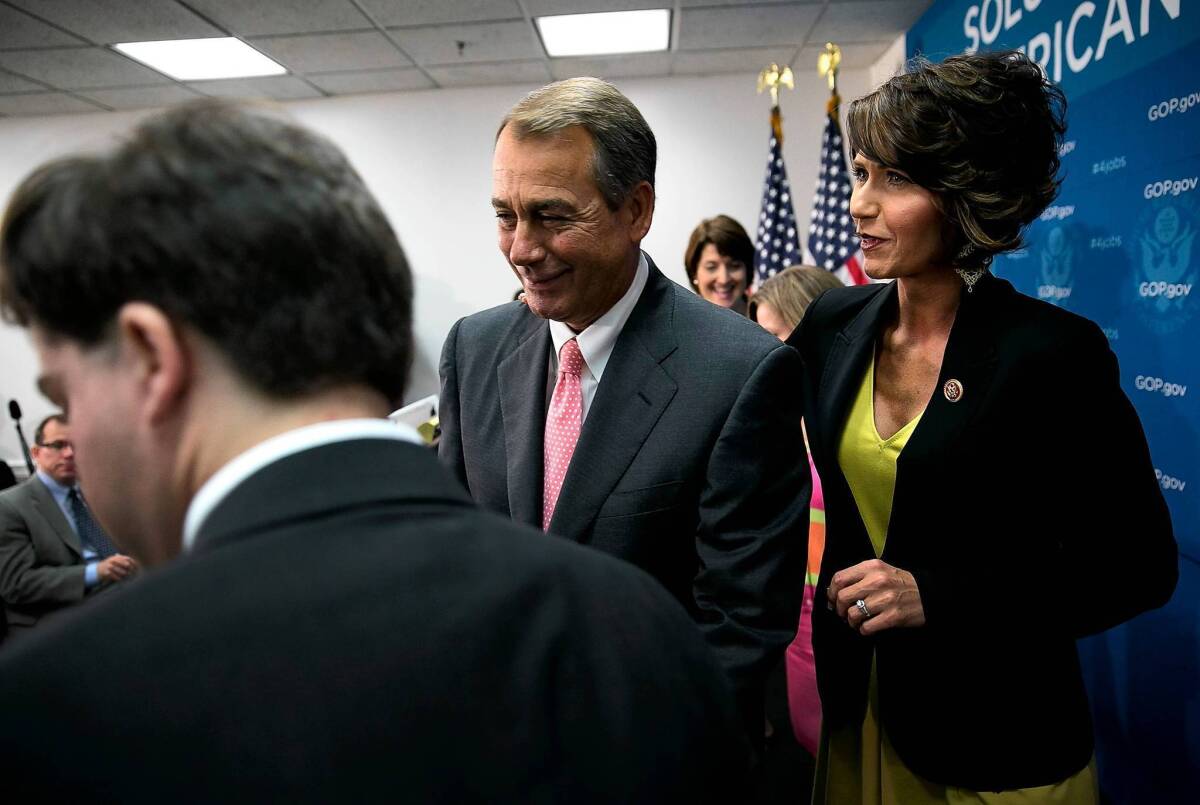Boehner torn between conservative issues and those with broad appeal

WASHINGTON — About once a week, like clockwork, House Speaker John A. Boehner insists in a Capitol news conference that jobs and the economy are the “No. 1 concern” of his GOP majority. But from week to week, there’s often another priority in the House.
On Tuesday, it was abortion, as Republicans passed one of the most stringent restrictions in a decade. In recent weeks, GOP-run committees held numerous hearings to investigate the Internal Revenue Service’s targeting of conservative nonprofits and the attack on the U.S. compound in Benghazi, Libya. And last month, House Republicans voted unanimously to repeal President Obama’s healthcare overhaul, the 37th vote to kill part or all of it.
The actions highlight Boehner’s quandary: The Ohio Republican wants to move legislation that broadens the party’s appeal, but he must also heed the desire of his conservative rank and file to push their priorities even if, like the abortion bill and healthcare repeal, they are going nowhere in the Senate, which is controlled by Democrats.
Kevin Madden, a former Boehner aide and an advisor to former Republican presidential candidate Mitt Romney, says Republicans can’t dismiss pressure from the party’s base to “pursue issues that draw distinct contrasts with Democrats,” such as abortion, because “values voters” are an important coalition.
“But the way to win and build a majority electoral coalition is by winning the larger debate over the economy and jobs,” he said. “The job of leadership is to convince the rank and file that their best chance to advance the party agenda is by focusing as much time persuading the big middle of the electorate as we do firing up the right flank of the electorate.”
The House has passed a few of the initiatives Majority Leader Eric Cantor (R-Va.) outlined at the start of the year under the banner of “Making Life Work,” such as one to revamp worker training programs. On Thursday, Boehner plans to deliver a speech to “discuss Republican efforts to create jobs, grow our economy, and restore America to a nation of builders.”
But the House has garnered far more attention for its focus on bills such as the abortion measure, called the Pain-Capable Unborn Child Protection Act, which passed on a largely party-line vote. Offered by Rep. Trent Franks (R-Ariz.), the bill bans abortions about four weeks earlier than the standard set by the U.S. Supreme Court in Roe vs. Wade.
At a hearing on the measure last week, Franks sparked an uproar when, arguing against exceptions for rape, he said that “the incidence of rape resulting in pregnancy are very low.”
Democrats quickly compared his statement to one made by Missouri Senate candidate Todd Akin last year on what he called “legitimate rape.” That remark contributed to Akin’s defeat and damaged the Republican Party’s image nationwide among a crucial swing constituency: moderate women.
“Many of our Republican colleagues don’t seem to have gotten that message,” Rep. Diana DeGette (D-Colo.) said at a news conference, where she was joined by newly elected Democrats who she said had won competitive races because Republicans “were so callous towards women’s healthcare needs.”
Republicans tried to undercut that argument in the debate on the House floor. They replaced Franks, who normally would have led the debate, with Rep. Marsha Blackburn of Tennessee. And eight of the 11 Republicans who spoke were women, although there are just 19 among the 234 House Republicans.
House Republicans defended their detour from the economy. “Jobs continues to be our No. 1 concern. And while we continue to be focused on this, there are other important issues that we have to deal with,” Boehner said last week when asked about the issue.
Rep. Raul Labrador (R-Idaho) said Republicans could “walk and chew gum at the same time.”
“We can protect innocent lives and protect American workers at the same,” he said.
But one of the six Republicans who voted against the measure, Rep. Rodney Frelinghuysen of New Jersey, was reluctant to discuss the issue. “It’s up to the leadership what they want to bring up. My focus is on jobs and the economy,” he said.
In the wake of GOP electoral defeats last November, the Republican National Committee issued a highly critical report that suggested these diversions sent the wrong message. “We have become expert in how to provide ideological reinforcement to like-minded people, but devastatingly we have lost the ability to be persuasive with, or welcoming to, those who do not agree with us on every issue,” it said.
The House has passed some jobs-related legislation, including the overhaul of worker training programs and a plan to allow employees to accept compensatory time off instead of overtime pay.
But neither chamber has passed much major legislation a quarter of the way through the 113th Congress. And after being derided in the last term by House leaders as the inefficient chamber, it is the Senate that has been ground zero for the most prominent debates of the year on immigration and guns. On Cantor’s website, the “jobs legislation tracker” lists only bills that moved in the 112th Congress.
The only significant bills to pass both chambers, including Superstorm Sandy relief and the debt-limit increase, have needed Democratic votes in the House. The reauthorization of the Violence Against Women Act passed without a majority of Republicans, as did the fiscal cliff deal at the close of the previous Congress in an unusual postelection session.
Many House Republicans say they are fulfilling the mandate from voters who kept them in power last fall as a check on Obama. Boehner acknowledged before the vote to repeal Obama’s healthcare law — which he had previously conceded to be “law of the land” after the Supreme Court upheld it — that his new members had “been asking for an opportunity to vote on it.”
Boehner also said Tuesday that he would not bring an immigration bill to the floor for a vote unless it was supported by a majority of his members. His pledge came one week after prominent conservative groups urged House Republicans to insist on adhering to that practice for all legislation. That threshold could make it difficult to draft a bill that could attract sufficient Democratic support in the Senate.
Ari Fleischer, a White House spokesman for President George W. Bush and an author of the RNC report, credited House leaders for making progress when they had to “walk a high wire every day and there’s no safety net underneath them.”
“There are always side issues, and every speaker dealt with the side issues because of the interests of various constituencies,” he said. “But on the main issues Boehner and Cantor get high marks.”
More to Read
Start your day right
Sign up for Essential California for news, features and recommendations from the L.A. Times and beyond in your inbox six days a week.
You may occasionally receive promotional content from the Los Angeles Times.







